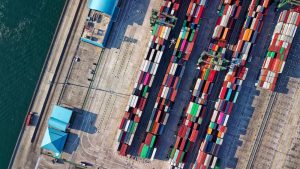Multiple experts say that the United States economy is teetering on the edge of a recession, and supply chain issues caused by multiple factors could make it happen.
Lockdowns in China and a shortage of long-haul truck drivers could create severe problems during the holiday season, says Stephan Weiler, a Professor of Economics at Colorado State University.
A third risk to the supply chain, a national U.S. railroad strike, was recently prevented when the federal government stepped in, but this interference in negotiation proceedings by the government has drawn much criticism. On December 2, President Joe Biden signed legislation to block a strike after some unions voted against the deal over a lack of paid sick leave.
As for trucker shortages, there are over 80,000 fewer truck drivers this year than in prior years, according to the American Trucking Association. In the next ten years, that number could double if truck driving conditions are not improved and younger demographics are not incentivized to become drivers.
And this worker shortage impacts more than just truckers, says Director of the RAND National Security Supply Chain Institute Bradley Martin — workers are also aging out of their roles at shipyards and other skilled labor positions.
Martin added that the "zero-COVID" policies in China are also causing potential issues — but not because of the policies themselves. Instead, protests against these policies — which became more frequent and intense after a fire in an apartment building killed at least 10 when COVID lockdown procedures hindered firefighters from getting to the blaze — could be the real problem. As protests in China are rare, the blowback from the government could be intense, says Weiler, ultimately resulting in a "gruesome effect" on the world economy.
"I think the protests are brave and legitimate given the circumstances that that country has been under since the pandemic began, but I'm just afraid of the government response," Weiler says. "I think there's greater fear than optimism regarding the protests."




















